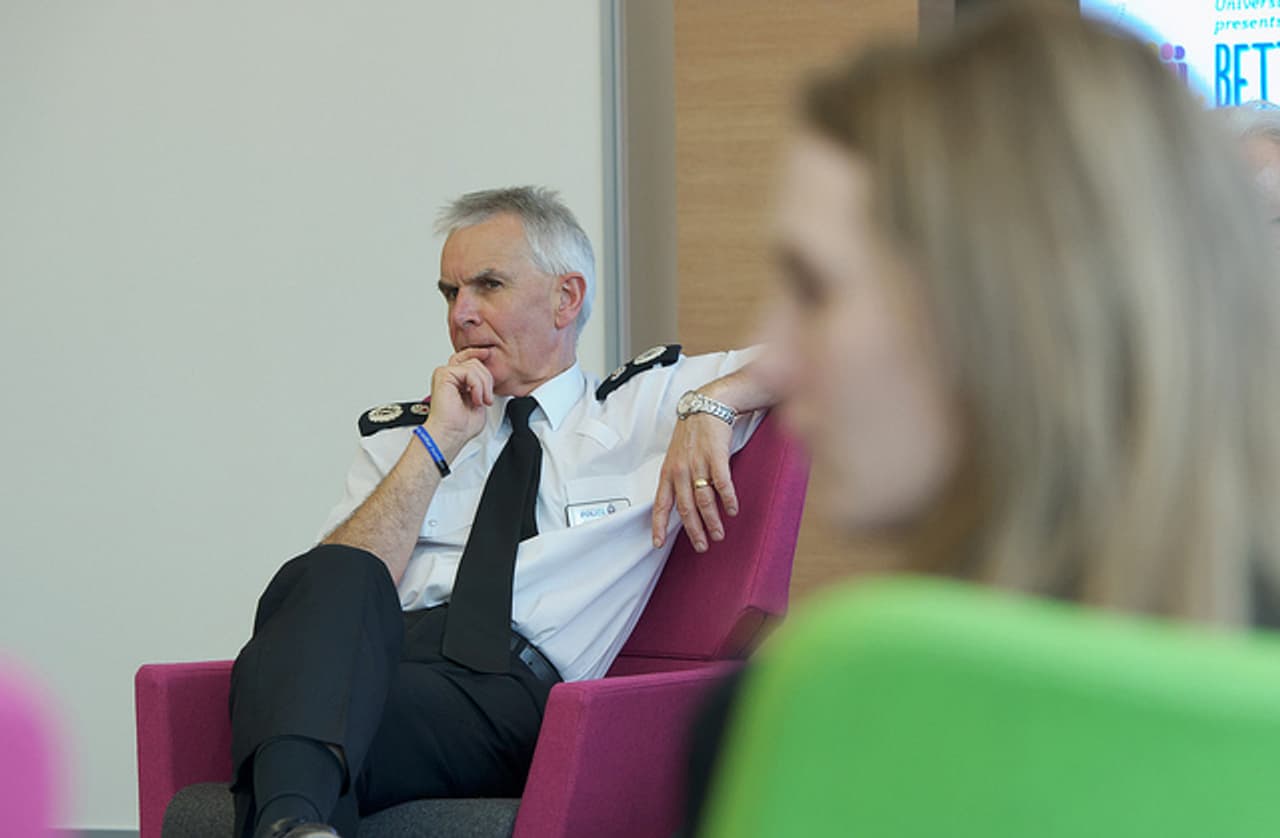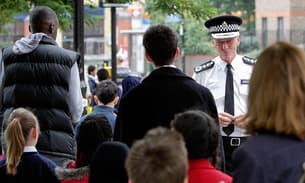
Greater Manchester Police faces multiple probes into its response to sex crimes
Sir Peter Fahy by University of Salford at Flickr
Greater Manchester Police (GMP), which was heavily criticised last year over a child sex grooming scandal, is facing multiple further investigations into its handling of sexual offence allegations, the Bureau can reveal.
The revelation follows news that Sir Peter Fahy, GMP’s Chief Constable, is at the centre of a criminal inquiry into a surveillance operation in which a vulnerable teenager was allowed to enter the home of a suspected paedophile.
In the past two and a half years the Independent Police Complaints Commission has launched a total of 10 inquiries into alleged mishandling of sexual assault and rape complaints by GMP.
IPCC data obtained under the Freedom of Information Act shows that the force accounts for more than a fifth of all such probes started by the police watchdog in England and Wales between January 1 2012 and June 17 2014.
There have been more investigations into handling of sex crimes at the GMP, the second largest force in England and Wales, than at London’s Metropolitan Police, the country’s biggest force.
At the Met, which is considerably bigger and has been repeatedly criticised over the last decade for its management of sexual offence complaints, only six inquiries have begun since 2012, of which one has closed with no case to answer for any officers.
No similar investigations have taken place in that time at Merseyside Police, West Yorkshire or West Midlands Police, which are also large forces.
Two of the 10 inquiries into GMP relate to the force’s handling of separate rape allegations that were made as recently as November 2013.
Eight of the 10 probes are still active while two have closed with disciplinary action taken against the officers involved.
Related story: Rape has been “decriminalised” for the most vulnerable, says senior Met adviser
Yesterday it emerged that GMP’s Chief Constable Sir Peter Fahy and two of his senior detectives were facing a criminal investigation following an inquiry by the police watchdog into how the force dealt with a suspected sex offender.
GMP detectives are alleged to have failed to detain a suspected paedophile who was under surveillance and allowed a vulnerable boy to enter his home without intervening.
The criminal investigation into Fahy will examine if he had knowledge of the operation.
The move relates to a whistleblower’s claim that the force mishandled a sexual offence allegation made against the suspected paedophile in 2012 and then covered up its failings.
The IPCC said yesterday: “Sir Peter Fahy has been served with a criminal and gross misconduct notice in relation to his alleged support to an allegedly poorly-handled investigation into a suspected sex offender.”
A serving Detective Superintendent and Detective Chief Inspector and a retired officer had also been served with criminal and gross misconduct notices for their roles in the investigation, the watchdog added.
The development is the latest in a series of events that has led a local MP to accuse the force of putting vulnerable members of the public at risk by its failure to learn from past mistakes in its handling of sex crimes.
The force has been under heavy pressure to improve its response to victims of sex crimes since 2011, when its failures in the Rochdale grooming cases became clear.
The results of an internal inquiry, supervised by the IPCC, into the force’s handling of the Rochdale investigation is expected shortly.
This internal inquiry was started before 2012 so is not included in the ten inquiries opened since then.
Lessons not learned, says local MP
Labour MP for Rochdale Simon Danczuk told the Bureau: “Several months ago I personally raised concerns about GMP’s response to sexual violence complaints with the chief constable.
My view is that this is a cultural problem – the culture needs to change, from the top. Because that hasn’t happened, the force is not learning lessons from what has gone before.”
He added: “This is not just a bureaucratic exercise. While the force is failing to learn, vulnerable adults and children continue to be raped and sexually abused. We know that happened in Rochdale.”
Majority of complaints under investigation are considered particularly serious
There are three levels of IPCC involvement in inquiries.
The watchdog may run investigations itself or can either “manage” or “supervise” the force’s investigation. Management requires greater IPCC involvement than supervision.
The majority of the investigations into GMP since 2012 have been run by the police watchdog itself, meaning the complaints under investigation are considered particularly serious.
Seven of the eight inquries that are currently live are being run by the IPCC, with just one run by the force with IPCC supervision. One probe began life as a force investigation with IPCC ‘management’ in 2013 but the watchdog decided in June this year to run the inquiry itself, taking responsibility away from the GMP.
The IPCC “wanted a greater degree of oversight,” a spokesman for the watchdog told the Bureau.
Related story: Type of underwear’ influenced CPS decision to drop rape case
A report by Her Majesty’s Inspectorate of Constabulary published earlier this year found GMP had failed to record almost 30% of crimes reported to it. The report, which focused on 13 forces, specifically highlighted failure to record rapes. However the report did not specify whether GMP was one of the forces were falling short in this regard.
GMP has also been heavily criticised by HMIC this year for its response to domestic violence reports. A report published in March said there were “serious weaknesses in the way the force responds to victims and manages their safeguarding.” This is despite a series of high profile murders of women by their partners stretching back over several years.
One of the current IPCC investigations concerns the murder of young mother Linzi Ashton by her partner after she had reported to the police that he had raped and assaulted her.
We asked GMP to comment on the high level of IPCC investigations since 2012 and for its response to Danczuk’s claim that their failure to learn lessons meant that women were continuing to be abused.
Chief Inspector Mike Dawson, of GMP’s Professional Standards Branch, said: “Like most forces across England and Wales, GMP has experienced an increase in complaints to its Professional Standards Branch in recent years, particular in relation to sexual offences.
“Investigations into these serious sexual offences deal with difficult, serious and sensitive issues which can often lead to allegations of mishandling especially if the victims expectations are not met.”
He added: “GMP’s approach to investigating sexual offences is entirely victim focussed and we work extremely hard with our partners to provide care and support to those who come forward and report what has happened to them.
We recognise that we do not always get things right and are constantly striving to improve what we do. Learning the lessons from complaints is an important part of that process.”
Commenting on the notices served by the IPCC, Sir Peter Fahy said: “As a chief constable, you face making complex decisions on a daily basis about many high risk and challenging situations. It is right that this decision-making is scrutinised and that I am held to account as part of this investigation.”
The 10 inquiries
These concerned:
1. The force’s response to a rape reported in November 2013. The IPCC, which is running this investigation, said: “As well as considering whether there is any evidence of misconduct by individual officers or staff, the IPCC is also examining whether there is any wider learning for the force as to how it can improve its response to such crimes in future.”
2. The GMP’s handling of another rape allegation made in November 2013. Supervised inquiry, now closed. A call handler and officer received “management action” over the initial reporting of the offence and in relation to the use of an interpreter.
3. The GMP’s response to allegations of sexual assault made in 2011. In October 2013 the case was referred to the IPCC which originally decided that the force should conduct the inquiry, with IPCC management. But in June 2014 the watchdog took over full responsibility for the probe, saying that it wanted more oversight of it.
4. Police contact with Tracey Shelvey, who killed herself in February 2014 after the man she had accused of rape was acquitted at trial. GMP had already referred itself to the watchdog in 2012 over its handling of Ms Shelvey’s rape allegations;
5. A whistleblower’s claim that the force mishandled a sexual abuse allegation made in 2012 then covered up its failings. The IPCC is running the investigation, which yesterday resulted in criminal and gross misconduct notices being served on the force’s chief constable.
6. The force’s response to an allegation of knife-point rape made in 2010, days before the accused man, Stephen Akinyemi, was shot and killed during a struggle. The shooter claimed officers had enough intelligence to charge Akinyemi with rape and so ‘remove a dangerous and violent criminal from circulation’ but failed to do so. The IPCC is running the probe and announced in March 2014 that two serving detectives and two retired officers were under investigation for misconduct in public office in relation to this case;
7. Murdered mother Linzi Ashton who had had told officers that her ex-partner Michael Cope had raped and assaulted her in the months before she was killed by Cope in 2013.
8. Supervised investigation which resulted in the force applying “unsatisfactory performance procedures” in relation to an officer. The IPCC has not yet signed this off, so the force would not release details.
9. Supervised investigation that is still open. The force refused to provide details.
10. Allegations that GMP did not effectively investigate sexual assaults against women from Rochdale. The IPCC-run inquiries follows concerns expressed during the trial of two men – Mahfuzur Rahman, 25 and Abdul Hannan, 36 – who were convicted in 2012 of offences including rape and sexual assault on women from the Rochdale area who were aged between 14 and 22 at the time of the offences. The offences took place between December 2009 and September 2011.
The Rochdale investigations
There are currently two IPCC inquiries relating to separate sexual offences perpetrated on young women and underage girls in the Rochdale area.
The publication of a report by the force following an IPCC supervised investigation that began in 2011, is imminent. The second investigation, begun in 2012, is being run by the IPCC itself and is ongoing.
In 2008 an under-age girl told GMP she had been groomed and raped by a restaurant worker. The man was not prosecuted, but in 2009 a second teenager made a similar claim, prompting the GMP to launch “operation Span” to investigate allegations of sexual exploitation.
It later emerged that during Operation Span, GMP recorded rape allegations of rapes from two victims as ‘non-crimes’, meaning that the details of the allegation were not recorded as a crime and the names and details of the alleged offenders not recorded on police databases.
The force began scrutinising its response to the 2008 rape claim in January 2011, under IPCC supervision.
But neither this probe nor Operation Span prevented the rape of a young woman by Abdul Hannan in September 2011, despite the fact that other women had given videotaped evidence against Hannan and his partner in crime, Mahfuzur Rahman, in 2009 and 2010.
Following Rahman and Hannan’s convictions for rape and sexual assault in May 2012, the IPCC decided to investigate the force’s response to Hannan’s victims. That probe is still active.
The force’s supervised investigation into the 2008 complaint has now finished, but has not been published.
GMP had to submit three separate reports of this supervised inquiry to the IPCC after the watchdog rejected two of them.
An IPCC spokeswoman said: “We received the first report in May 2012, which we rejected as there was further investigative work to be done by GMP. We then received a revised report in May 2013, which we felt did not show all the investigative work done. We then received a third version of the report in mid-November.”
The third report was accepted, the spokeswoman added.
A spokesman for the force said the report’s publication was imminent.




